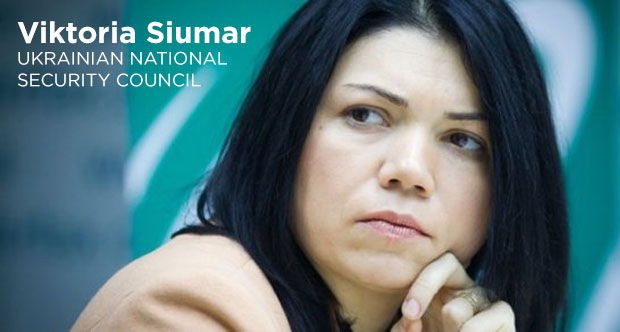
Kyiv Battles Kremlin Myths, Siumar Says; Is Not Considering Martial Law
As Ukraine and its government battle Russian-backed secessionist militias in its two southeastern provinces, it also confronts public fears and suspicions among many of the 6.6 million people there (14 percent of Ukraine’s population). That is largely because Russia has had a free hand for twenty years in molding popular opinions among millions Ukrainians – notably those who are native Russian-speakers, says Viktoria Siumar, the deputy secretary of Ukraine’s National Security Council.
Since Ukraine won its independence from Moscow during the collapse of the Soviet Union, public discourse “was incredibly intertwined with Russia’s information space,” Siumar said in an online discussion today with the Atlantic Council. As Putin has suppressed most independent media in Russia during his 15 years in power, Russian television channels and other media have become “an extension of the policies of the Kremlin, particularly regarding Russia’s immediate neighbors.”
The Kremlin has used that opinion-shaping power to build fearful “myths” about Ukraine among residents of the largely Russian-speaking provinces in the southeast, Siumar said. “One of these myths is the alleged ‘fascist threat’” arising from the emergence last winter of the anti-corruption and pro-democracy Maidan movement in Kyiv, she said.
Siumar, a journalist and journalism lecturer who joined the government after the Maidan’s overthrow of President Viktor Yanukovych, spoke from the National Security Council headquarters in Kyiv. She took questions from journalists in a discussion moderated by the Atlantic Council’s executive vice president, Damon Wilson.
Among other points by Siumar were these:
- Ukraine is not preparing any broad application of martial law, she said, denying news agency reports that such a move is under consideration.
- The government is working to strengthen its ability to control its border with Russia, following attacks in the past day on bases of border security forces in Luhansk.
- Ukraine’s advantage in its “information war” with Russia is that “we don’t have to invent myths. It’s enough for us to show the truth.”
Image: Viktoria Siumar, a career journalist who now is the deputy secretary of Ukraine's National Security Council, spoke to the Atlantic Council June 4.
